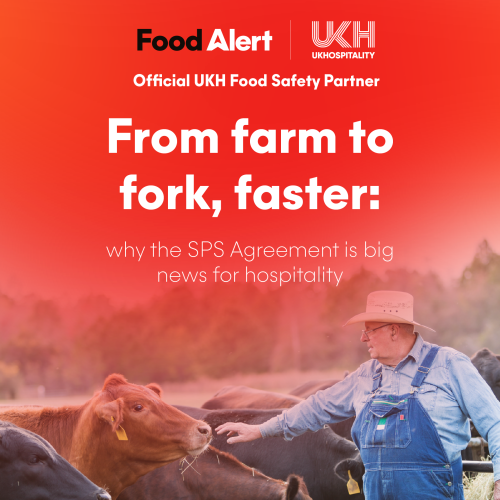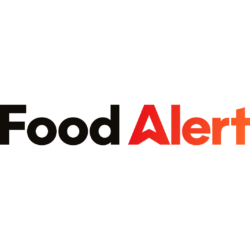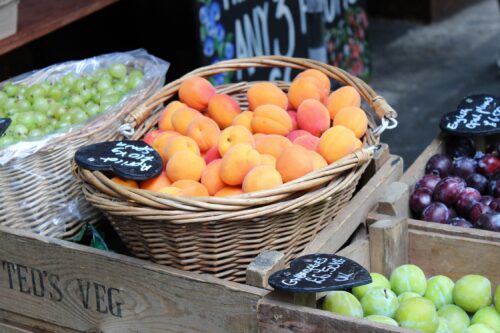From farm to fork, faster: why the SPS Agreement is big news for hospitality

As UKHospitality’s official food safety partner, Food Alert is here to help the industry navigate these complex regulatory changes with confidence.
With decades of expertise in compliance and risk management, they support businesses in understanding how to stay safe and secure when it comes to managing supply chains. In this article they will break down the latest news in hospitality.
The UK-EU trading relationship has been turbulent for a few years, and hospitality has often been caught in the crossfire. But there’s some good news on the horizon; the UK and EU are working towards a new Sanitary and Phytosanitary Agreement, or SPS Agreement for short.
This agreement might sound technical, but at its heart it’s about making the movement of food, plants and animals between the UK and EU smoother, safer, and more predictable. For restaurants, pubs, cafés and hotels that depend on reliable supply chains, this could be a gamechanger.
A quick recap: why an SPS Agreement matters
When the UK left the EU, it also left the shared system of food safety and animal and plant health rules that kept trade flowing without friction. Suddenly, businesses moving goods between the UK and EU had to deal with new certificates, inspections and border checks. For sectors like hospitality, where freshness and timing are everything, these changes translated into delays, costs and mounting uncertainty.
An SPS Agreement would create a standardised procedure so that both sides follow the same food safety and biosecurity rules. That would translate into fewer border checks, less paperwork, and quicker, more reliable deliveries.
Key aspects of the new SPS Agreement
- 1
Territorial scope
The SPS Agreement will apply to trade between the EU and Great Britain, with particular significance for Northern Ireland under the Windsor Framework. Goods moving between Great Britain and Northern Ireland would also benefit from simplified processes, provided the Agreement is fully implemented.
- 2
Dynamic regulatory alignment
Great Britain will be required to remain aligned with relevant EU SPS laws. Any divergence could see border checks reimposed. For UK food and agriculture importers, this means:
- Monitoring changes in EU SPS legislation
- Adapting swiftly to new EU standards
- Making sure that suppliers and partners are equally compliant
- 3
Streamlined certification
If enacted, most agri-food trade between the UK and EU will no longer require Export Health Certificates (EHCs), Phytosanitary Certificates, or similar paperwork. This would significantly cut red tape and ease cross-border trade.
- 4
Exceptions and safeguards
The Agreement allows for limited exceptions to alignment, but only where UK standards are equal to or higher than those of the EU, and where no adverse effects arise for EU markets. Crucially, goods entering the EU must remain fully compliant, keeping compliance and traceability central for customs brokers.
- 5
Joint governance and dispute resolution
The framework will be overseen by a joint EU-UK governance mechanism and arbitration panel, with the Court of Justice of the EU having final jurisdiction on EU law matters. This provides strong legal backing and clarity for enforcement.
Recent developments - a pause on extra border checks
In August, the UK government confirmed that additional checks on live animals and certain plant and animal products coming from Ireland and Northern Ireland have been suspended. Ministers judged these checks to be “disproportionate” while talks continue.
Non-qualifying goods from Ireland and Northern Ireland can continue to enter the UK without physical inspections, although in some cases certification and pre-notification will still apply. The government has been clear that biosecurity remains a top priority, with risk-based surveillance still in place to protect consumers.
What’s on the table in negotiations
So, what exactly is being discussed? The EU’s negotiating mandate offers some useful clues. A central feature is something called “dynamic alignment.” In practice, this would mean that the UK agrees to keep its SPS rules in line with the EU’s, not only now but also in the future as EU rules evolve.
For businesses, this could bring some much-needed stability. If the UK and EU are operating to the same standards, then ingredients, produce and animal products can flow with fewer interruptions. However, it also means the UK would have less freedom to set its own rules in these areas. That trade-off is likely to remain politically sensitive, but for hospitality operators, the potential benefit is clear, which is fewer nasty surprises when sourcing from EU suppliers.
The scope of the deal is wide. It could cover everything from sanitary and phytosanitary controls, to food safety and consumer protection, to the regulation of live animals and plants, pesticides, and even organic production and labelling. This means that if your business relies on organic ingredients, specialist produce, or fresh imports, the SPS Agreement could make a huge difference to your costs and operations.
Another important element is border formalities. One of the main aims is to remove the need for routine certificates, veterinary or plant health checks, and physical inspections. The temporary suspension of some checks over the last few months is a small taste of what could become the norm under a full deal – smoother borders and fewer delays for perishable goods.
There are also proposals for how disputes would be resolved. The EU’s position is that its rules should be interpreted uniformly, with the European Court of Justice having the final say. This may feel far removed from day-to-day business operations, but it matters because it underlines the extent to which the UK would need to stay aligned with EU standards.
What this means for hospitality businesses
The implications of this agreement are huge. Supply chains should become more reliable, paperwork will be reduced, and the costs of importing food and drink from the EU should come down. That means fewer headaches when planning menus, pricing dishes, or sourcing specialist ingredients.
But it’s worth remembering that not everything will change overnight. Some goods will still require certification or advance notification, and the government has said that risk-based checks will remain in place. It’s also possible that there will be carve-outs, where certain products are excluded from the scope of the agreement.
How to prepare
The first step is to understand your own supply chains. Which of your ingredients, drinks or produce come from the EU, and where are the current pinch points? Mapping this out now will help you see where the SPS Agreement could ease pressure, and where challenges may remain.
It’s also a good idea to keep an eye on both UK and EU regulatory updates. Staying informed means you’ll be ready to adjust labelling, sourcing or compliance as needed.
Finally, think about flexibility. Even with an agreement in place, the landscape will continue to shift. Being ready to adapt menus, switch suppliers, or reformulate recipes could help you make the most of the opportunities while minimising risks.
Looking ahead
The SPS Agreement has the potential to make life much easier for hospitality businesses across the UK, by cutting red tape and reducing costs. Aligning food safety standards should help make sure that the fresh, high-quality produce you need arrives when you need it.
Of course, there are still uncertainties to watch out for, such as how quickly the UK will adopt future EU rule changes, how wide the scope of the agreement will be, and what happens in areas not covered. But the direction of travel is positive.
For now, the best approach is to stay engaged, stay informed, and start planning for a smoother trading environment. If all goes well, the SPS Agreement could mean less time spent worrying about supply chains, and more time focusing on what matters most – delivering great experiences for your customers.
How Food Alert can help
While the SPS Agreement promises to reduce friction at the border, no trade deal can remove every challenge. That’s why building resilience into your supply chain is so important. At Food Alert, we’re here to help hospitality businesses take control with tools that make managing suppliers, monitoring compliance and keeping track of product safety simple and effective.
Our Alert65 supply chain management module gives real-time visibility of your supplier network, so you can spot risks early, stay compliant with food safety standards, and stay consistent across all your sites. Our team of experts will help you save time, reduce risk and protect your reputation, whatever changes the UK-EU relationship may bring.
Call 020 7244 1900 or click here for more information.





